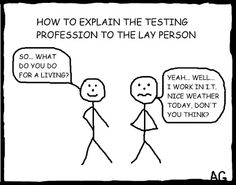What is QA?

“The bitterness of poor quality remains long after the sweetness of meeting the schedule has been forgotten.” -Anonymous
Hello! My name is Mick Stevens and I am the Quality Assurance (QA) person in the Project Management Office (PMO). The PMO is currently focusing on ways to provide more value to projects within ITS. We have a lot to offer to both new and existing projects so we are conducting a series of short presentations to introduce ourselves to small groups within ITS. These presentations intend to show how we can offer value and support in the areas of:
- Project Management (PM)
- Business Analysis (BA)
- Quality Assurance (QA)
- and Training.
I was very excited to kick off our first of many presentations by talking about QA. I was excited because there are so many differing views on what QA, Quality, and Testing is… how it should be done, and what it should (or should not) do. This could be an opportunity to provide some clarity for these topics as they relate to the projects at UConn. Or so I thought.

While preparing for the presentation, I quickly realized that there is no hope of covering all this information in one short 15-minute presentation. QA and Testing is just too large of a topic. We only have time to give a quick overview and show some ways we have helped other projects in the past. But these presentations are a great way to get our word out, and hopefully generate some interest.
Our main goal for these short presentations is to show how we can offer assistance to projects so people will consider consulting with us for help on their next project.
However, there is much more I want to say about these topics around QA. In fact, the first draft I wrote to talk about them was so large that I was sure no one would take the time to read it. So, I have decided instead, to do a series of blog posts, focusing on each of the topics individually. These posts will attempt to clarify the confusion around QA, Quality, and Testing, and show why that confusion exists. I will then wrap up the series with a summary of the many ways QA, and the whole PMO team, can help on your next project.
In this first post, we will take a closer look at QA.
Now, I have already summarized how Quality Assurance pertains to UConn on the What is QA page of this website, and this information is still 100% correct. Also on this page, we have defined QA as “an activity that establishes and evaluates the processes that produce products.” Where “products” can be hardware, software, upgrades or integration projects. I highly recommend reading this page first to get the full picture of QA in the PMO. However, in this post, I want to talk more about why there is so much confusion around QA.
For Example:

I have seen the confusion in people’s faces when they ask me what I do and I tell them, “QA Analyst” or “Quality Assurance.” I then explain, “it’s just a fancy word for a software tester.” Which it is not, it’s more than that, but that is a little more relatable to most people. One time, I couldn’t find the right, “relatable,” word so the person said, “Oh, you work with computers – in I.T.” So now, I just say that I work in I.T.
I have to confess that before I started working at UConn, I did not fully realize all the things a QA Analyst did. I almost didn’t even respond to the job offer because of the title, but when I read the description, I realized that this was the perfect fit for me. It was everything I had been doing (and loved doing) for the last 30 + years! I just had different titles.
So that is one reason for the confusion. We have to call it different things so others can relate it to something they understand. And now, when these people hear the word QA, they are going to think, software tester, or computers, or programmer, or whatever someone told them in the past.
To add to this confusion, up until a few years ago, there was no direct career path to QA, or software tester. QA was like a side job. If you worked in IT, you would probably be asked to do some testing at some point. When the PMO was moved from Finance Systems to ITS, I was a little concerned for just that reason. ITS did not have a formal QA group, but what I found was, like other groups, each group did their own testing as needed. This is a good thing because that is a big part of the QA effort, and we will need more people testing going forward.
Another Example:
In August of 2019, I went to my first testing conference, which was attended by testers from all over the world. Very few of these testers had the title of tester. They were QA Analysts, QA Specialists, Product Specialist, Release Specialists, or just QA. Most of them, however, just liked being called a tester.
One of the most surprising things I learned at this conference was that practically all of these testers fell into their roles in unexpected ways. Almost no one started out as a tester, but they all enjoyed it so much that they made a career out of it. Everyone had a story, and they loved talking about it.
As I look back on my career, I find that I too have been unknowingly moving toward this role of QA and tester. I even wrote a blog post about it where I talk about my conference experience, and how I was uniquely prepared for this role. I hope you have a chance to read it.
While you are on the PMO website, please look around and see what else we have to offer. You will find several more blog posts about both Project Management and QA. The QA posts reflect my progress and newfound understanding of QA and testing since starting at UConn.
Next week we will attempt to clarify Quality in general, and understand why it can be so confusing.
Remember…

Thanks for stopping by!
Mick
Related articles:
Reflections from My First Testing Conference
Introducing QA Part 2: What is Quality?
Introducing QA Part 3: What is Testing?
Introducing QA Part 4: How can QA Help You?